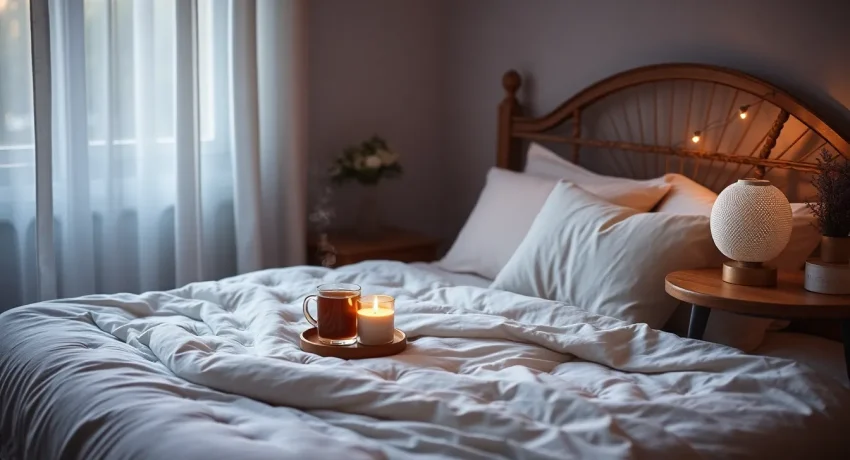Table of Contents
ToggleIn a world where counting sheep seems more like a nightly ritual than a sleep solution, finding ways to sleep better naturally is a quest many embark on. It’s time to ditch the sleep aids that promise sweet dreams but deliver restless nights. Who needs that kind of drama? Instead, let’s explore simple, effective methods that can transform your sleep from a tossing-and-turning saga into a peaceful slumber story.
Understanding Sleep
Sleep plays a crucial role in overall health. A deep understanding of sleep can lead to better strategies for improvement.
Importance of Sleep
Sleep impacts physical and mental well-being. During sleep, the body goes through repair processes, enhancing immune function and muscle recovery. Quality sleep supports cognitive functions, including memory retention and problem-solving skills. According to the National Sleep Foundation, adults require between 7 to 9 hours of sleep nightly for optimal health. Insufficient sleep can lead to chronic conditions such as obesity, diabetes, and heart disease. Restorative sleep boosts mood, enhancing emotional stability and resilience. Making sleep a priority promotes longevity and reduces stress levels.
Stages of Sleep
Sleep consists of different stages that are essential for recovery. REM (rapid eye movement) sleep and non-REM sleep represent these stages. Non-REM sleep is divided into three phases: light sleep, deep sleep, and a transitional stage. Light sleep enables easy awakening, while deep sleep fosters physical recovery and growth. REM sleep, which occurs after deep sleep, is vital for cognitive functions, including dreaming and learning. Each stage cycles multiple times throughout the night, with one complete cycle lasting about 90 minutes. Understanding these stages helps to optimize sleep patterns for better rest.
Factors Affecting Sleep Quality

Multiple factors influence sleep quality, impacting overall well-being. Identifying and addressing these elements can lead to improved rest.
Stress and Anxiety
Stress and anxiety significantly disrupt sleep cycles. Elevated levels can lead to racing thoughts or tension, making it hard to unwind. Techniques like mindfulness meditation and deep breathing exercises can reduce stress. Engaging in regular physical activity also helps alleviate anxiety. A calm bedtime routine fosters relaxation, aiding in the transition to sleep. Addressing stressors during the day creates a more peaceful nighttime environment.
Diet and Nutrition
Diet and nutrition play crucial roles in sleep quality. Consuming large meals or heavy foods close to bedtime can cause discomfort and disrupt sleep patterns. A balanced diet rich in fruits, vegetables, and whole grains promotes better sleep. Specific nutrients, like magnesium and tryptophan, have calming effects on the body. Herbal teas such as chamomile or valerian root can also aid relaxation. Staying hydrated throughout the day supports optimal sleep, but limiting caffeine and alcohol intake before bedtime is vital for restful slumber.
Natural Methods for Better Sleep
Natural methods can significantly enhance sleep quality. Exploring various techniques may lead to more restful nights.
Herbal Remedies
Herbal remedies offer potential benefits for sleep improvement. Chamomile tea, for instance, promotes relaxation due to its mild sedative properties. Valerian root is another popular option, often used to decrease sleep latency and increase sleep duration. Lavender essential oil, when diffused or used in a bath, has calming effects and may help reduce anxiety levels. Passionflower is yet another herb that can effectively support restful sleep. Incorporating these herbs into a nightly routine can create a soothing environment conducive to sleep.
Sleep Hygiene Practices
Practicing good sleep hygiene plays a vital role in achieving better rest. Establishing a consistent sleep schedule helps regulate the body’s internal clock. Creating a relaxing bedtime ritual signals the brain that it’s time to wind down. Limiting screen time before bed is crucial since blue light can disrupt melatonin production. Keeping the bedroom dark, cool, and quiet further enhances sleep quality. Lastly, investing in a comfortable mattress and pillows contributes to a more restorative sleep experience.
Mindfulness and Meditation
Mindfulness and meditation provide tools to calm the mind and body for improved sleep. Engaging in deep breathing exercises lowers stress levels and prepares individuals for rest. Progressive muscle relaxation techniques can help release physical tension accumulated throughout the day. Guided imagery exercises encourage individuals to visualize peaceful scenes, leading to tranquility. Regular practice of mindfulness meditation fosters greater awareness of thoughts, promoting a healthier sleep mindset. By incorporating these practices into the evening routine, individuals may find themselves drifting off more easily.
Lifestyle Changes to Improve Sleep
Making lifestyle adjustments can significantly enhance sleep quality. Simple changes often lead to restful nights.
Regular Exercise
Engaging in regular exercise promotes better sleep. The National Sleep Foundation notes that physical activity helps reduce anxiety and stress, key factors that disrupt sleep patterns. Ideally, aiming for at least 150 minutes of moderate exercise weekly can yield significant benefits. Exercising earlier in the day proves more effective at enhancing sleep quality compared to late-night workouts. Activities like walking, swimming, or yoga improve overall well-being, contributing to deeper, more restorative sleep cycles.
Creating a Sleep-Conducive Environment
Establishing a sleep-conducive environment plays a vital role in achieving restful sleep. A dark, quiet room creates an ideal atmosphere; consider using blackout curtains or eye masks to minimize light exposure. Maintaining a cool temperature between 60 and 67 degrees Fahrenheit optimizes comfort during sleep. Moreover, investing in quality mattresses and pillows promotes proper spinal alignment. Reducing noise with white noise machines or earplugs can further enhance tranquility. Personalizing the space with calming colors and scents, like lavender, can create a more inviting ambiance for sleep.
Achieving better sleep naturally is within reach for anyone willing to explore effective strategies. By prioritizing sleep hygiene and incorporating relaxation techniques into their routine, individuals can transform their nights from restless to rejuvenating.
Embracing lifestyle changes such as regular exercise and mindful practices can significantly reduce anxiety and stress. Creating a calming sleep environment and being mindful of dietary choices further enhances the quality of rest.
With dedication and the right approach, restful nights are attainable, leading to improved overall health and well-being. It’s time to take charge of sleep and unlock the benefits of a good night’s rest.




